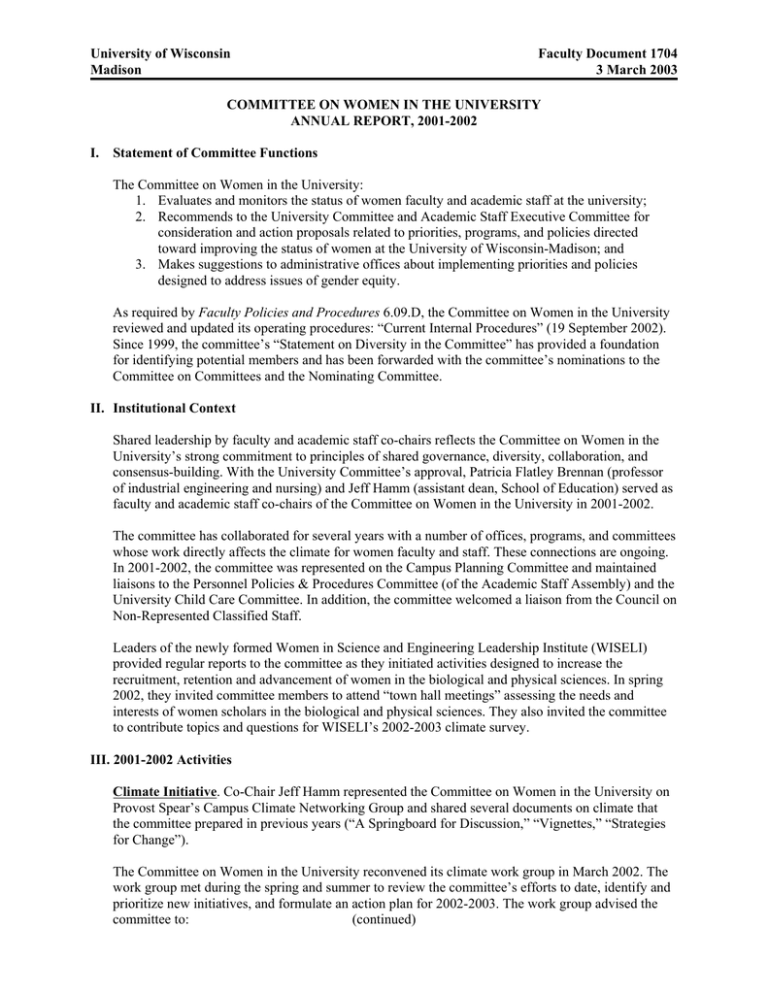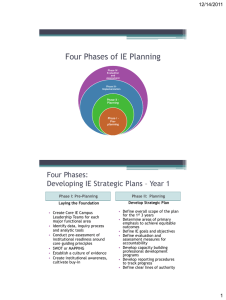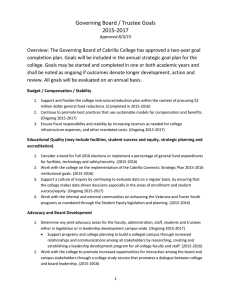University of Wisconsin Faculty Document 1704 Madison 3 March 2003
advertisement

University of Wisconsin Madison Faculty Document 1704 3 March 2003 COMMITTEE ON WOMEN IN THE UNIVERSITY ANNUAL REPORT, 2001-2002 I. Statement of Committee Functions The Committee on Women in the University: 1. Evaluates and monitors the status of women faculty and academic staff at the university; 2. Recommends to the University Committee and Academic Staff Executive Committee for consideration and action proposals related to priorities, programs, and policies directed toward improving the status of women at the University of Wisconsin-Madison; and 3. Makes suggestions to administrative offices about implementing priorities and policies designed to address issues of gender equity. As required by Faculty Policies and Procedures 6.09.D, the Committee on Women in the University reviewed and updated its operating procedures: “Current Internal Procedures” (19 September 2002). Since 1999, the committee’s “Statement on Diversity in the Committee” has provided a foundation for identifying potential members and has been forwarded with the committee’s nominations to the Committee on Committees and the Nominating Committee. II. Institutional Context Shared leadership by faculty and academic staff co-chairs reflects the Committee on Women in the University’s strong commitment to principles of shared governance, diversity, collaboration, and consensus-building. With the University Committee’s approval, Patricia Flatley Brennan (professor of industrial engineering and nursing) and Jeff Hamm (assistant dean, School of Education) served as faculty and academic staff co-chairs of the Committee on Women in the University in 2001-2002. The committee has collaborated for several years with a number of offices, programs, and committees whose work directly affects the climate for women faculty and staff. These connections are ongoing. In 2001-2002, the committee was represented on the Campus Planning Committee and maintained liaisons to the Personnel Policies & Procedures Committee (of the Academic Staff Assembly) and the University Child Care Committee. In addition, the committee welcomed a liaison from the Council on Non-Represented Classified Staff. Leaders of the newly formed Women in Science and Engineering Leadership Institute (WISELI) provided regular reports to the committee as they initiated activities designed to increase the recruitment, retention and advancement of women in the biological and physical sciences. In spring 2002, they invited committee members to attend “town hall meetings” assessing the needs and interests of women scholars in the biological and physical sciences. They also invited the committee to contribute topics and questions for WISELI’s 2002-2003 climate survey. III. 2001-2002 Activities Climate Initiative. Co-Chair Jeff Hamm represented the Committee on Women in the University on Provost Spear’s Campus Climate Networking Group and shared several documents on climate that the committee prepared in previous years (“A Springboard for Discussion,” “Vignettes,” “Strategies for Change”). The Committee on Women in the University reconvened its climate work group in March 2002. The work group met during the spring and summer to review the committee’s efforts to date, identify and prioritize new initiatives, and formulate an action plan for 2002-2003. The work group advised the committee to: (continued) -2- 1. 2. 3. 4. continue to have a work group on climate in 2002-2003; refine the committee’s definition of climate and develop talking points on climate; design a climate workshop on modeling positive/alternate behaviors to establish new norms; and recommend inviting Virginia Valian, author of Why So Slow: The Advancement of Women, to present a public lecture on climate and to meet with groups working on climate issues in 20022003 or 2003-2004. The Committee on Women in the University recognizes that campus climate is an issue of significant concern to many constituencies and welcomes opportunities to work collaboratively with other campus groups to improve work and learning environments. The committee’s particular focus is to assure that these environments support and value women’s contributions. In December 2001, the committee was pleased to receive and discuss the Council on Non-Represented Classified Staff’s “Statement on Climate Issues.” Data on Women Academic Staff. The Committee on Women in the University continues to monitor academic staff appointments and job security. Margaret Harrigan (policy & planning analyst, Office of Academic Planning & Analysis) provided data on the number of men and women holding category A, B, and C academic staff appointments (Appendix A: Academic Staff by Category and Gender). Ann Wallace (chair, Personnel Policies & Procedures Committee) provided data on academic staff job security. The committee determined that these data did not indicate a gender gap. Ann Wallace and Mary Ray (chair, Districting and Representation Committee) assisted the committee in understanding proposals before the Academic Staff Assembly to establish minimum appointment level requirements for election to the Academic Staff Executive Committee (50% FTE) or to standing/shared governance committees of the Academic Staff Assembly (33% FTE). (The assembly passed the first proposal; the second failed.) Data on Women Faculty. The Committee on Women in the University continues to monitor gender equity in faculty hires and promotions (Appendix B: University of Wisconsin-Madison Faculty Hires; Appendix C: Faculty Promotions to Tenure by Gender; Appendix D: Faculty Headcount by Rank and Gender; Appendix E: Headcount of Faculty and Staff by Gender). The percentage of women in the faculty as a whole has continued to increase, rising from 18.0% in 1990 to 24.7% in 2001. The committee thanks the Office of Human Resources and the Office of Academic Planning and Analysis for continuing to provide these data and for including data on gender in the university’s Data Digest (available online at: http://www.bpa.wisc.edu/datadigest/DataDigest2001-2002.pdf). In May 2002, Linda Greene (associate vice chancellor for faculty & staff programs) provided data on the gender and race/ethnicity of faculty and staff hired through the Cluster Hiring Initiative, 19992002. Of the 434 faculty hired between 1999-2000 and 2001-2002, 144 (33%) are female. Of the 66 faculty hired through the Cluster Hiring Initiative during this period, 17 (26%) are female. Overall, 27% of both faculty and staff hired through the Cluster Hiring Initiative are women. Diversity in Hiring. Paul Barrows (vice chancellor for student affairs and chair, Wisconsin Union director’s search), Bernice Durand (professor of physics and chair, chancellor’s search), Rick Moss (professor of physiology and chair, provost’s search), and David Musolf (secretary of the faculty) met with the committee to discuss how to encourage women to apply for key administrative positions and for assuring equitable consideration of women in future searches. They described the university’s process for conducting searches and suggested several ways in which the committee could support consideration of women. One outcome of this discussion was David Musolf’s revision of a document offering sample language for advertisements and position descriptions. In the revised version, women as well as members of underrepresented groups are encouraged to apply. (continued) UW-Madison Fac Doc 1704 - 3 March 2003 -3Domestic Partnership Benefits. In December 2001, the Committee on Women in the University wrote a letter to Representative Mark Pocan in support of legislation to recognize domestic partnerships (LRB 3688/2) and equalize insurance benefits for domestic partners (LRB 3619/2). The committee is strongly committed to principles of equitable compensation and benefits and of nondiscrimination. Gender Equity in Faculty Pay. In September 2001, Linda Greene (associate vice chancellor for faculty & staff programs) and Margaret Harrigan (policy & planning analyst, Academic Planning & Analysis) presented a draft report on the 2000-2001 Faculty Gender Pay Equity Review to the committee and invited comments and suggestions. The committee recommended evaluating whether women involved in the process believe they received a fair and equitable review. In December 2001, the committee invited Phillip Certain (dean, College of Letters & Science), Robin Douthitt (dean, School of Human Ecology) and Paul Peercy (dean, College of Engineering) to share their perspectives on the issue of faculty gender pay equity and to outline their approaches for assuring pay equity in their respective divisions. The committee also received and responded to the Commission on Faculty Compensation & Economic Benefits’ analysis of the draft report. In February 2002, the committee forwarded recommendations for future action to Peter Spear (provost). These recommendations included: 1. conducting a formal review of the 2000-2001 exercise to assess: whether women faculty involved believe they received a fair and equitable review; whether the process met the needs of all faculty and created an environment in which gender pay equity will be sustained; whether certain campus practices (e.g., extending retention offers) contribute systematically to gender pay inequity; and whether factors that suppress the salaries of all faculty disproportionately affect women; 2. placing accountability for gender pay equity at the school/college level, with deans’ annual reports including an assurance that pay equity is being sustained and a detailed description of the process used to ensure that compensation for all faculty is based solely and equitably on work-related factors; 3. conducting periodic reviews at the campus level to assure that equity goals are being achieved campus-wide and to create a climate in which salary issues can be discussed openly without fear of intimidation or reprisal; and 4. permitting self-nomination in future campus-level reviews. Peter Spear and Linda Greene shared a draft policy with the committee in April 2002 and invited feedback. The committee thanks campus leaders for their commitment to analyze and address issues of gender equity in faculty pay. Sexual Harassment Resources & Information Project. The committee continues to monitor implementation of the Sexual Harassment Information & Resources Project. In 2001-2002, informational sessions were offered to employees in the Division of Intercollegiate Athletics, the Graduate School, the Medical School, the School of Pharmacy, and the School of Veterinary Medicine. Additional sessions are planned for 2002-2003. (continued) UW-Madison Fac Doc 1704 - 3 March 2003 -4- Work Life Issues. Lynn Edlefson (campus child care coordinator) provided an update on campus child care facilities, services, and concerns. In 2001-2002 her office and the University Child Care Committee focused on keeping excellent care provided by campus centers and affiliates affordable, addressing unmet needs for infant care on campus and in the community, and finding new ways to meet short-term back-up care and sick child care needs. Lynn Edlefson and Connie Wilson (chair, University Child Care Committee) invited committee members to participate in a discussion of back-up care needs and possible solutions in April 2002. Louise Root-Robbins (coordinator of women’s issues, Office of the President, UW System) shared information about work-life programs and offices at several universities participating in the College & University Work Family Association (CUWFA). Representatives of the committee participated in the University of Wisconsin System’s June 2002 Work-Life Forum. The committee is working to articulate the connections between work-life issues and climate. This will be a major focus in 2002-2003. IV. Current Issues and Concerns Attention to Process: assure that many voices are heard within and beyond the committee; coordinate/collaborate with other groups, particularly around work to improve campus climate. Climate: share ideas/information with the Campus Climate Networking Group and others; refine the committee’s definition of climate and develop talking points; design a climate workshop; work to bring speakers of national importance to UW-Madison (e.g., Virginia Valian); contribute to plans for and participate in a campus-wide day of listening and learning. Equity Issues: begin to study academic staff pay equity; identify measures of equity beyond salary (e.g., workload, teaching assignments). Sexual Assault/Violence: request information about costs to students for the Sexual Assault Nurse Examiner Program (SANE) exams. Senior Hires: continue to encourage hires/promotions of women into leadership positions. Work-Life Issues: identify areas for effort, including child care, dependent, elder care. (continued) UW-Madison Fac Doc 1704 - 3 March 2003 -5- V. Committee Membership, 2001-2002 Faculty: Linda Bartley School of Music Vicki Bier Industrial Engineering Patricia Flatley Brennan (Co-Chair) Industrial Engineering; School of Nursing Tonya Brito Law School Molly Carnes Medicine: Geriatric Medicine Cecilia Ford English Nancy Mathews Wildlife Ecology Beverly Moran Law Wayne Wiegand Library & Information Studies Academic Staff: Jeffrey Hamm (Co-Chair) Member Since Term Ends 2000 2003 1999 2002 1997 2003 2000 1998 1999 2001 1999 2001 2003 2004 2002 2004 2002 2004 2000 2003 Eileen Hanneman Judith Manning Steve Pearson Sharon Stern Phyllis Holman Weisbard School of Education, Academic Services Institute for Environmental Studies Medical Microbiology & Immunology Employee Assistance Office Undergraduate Admissions General Library System 1996 2000 2001 2000 2000 2002 2003 2004 2004 2002 Ex-Officio/Non-Voting: Linda Greene Luis Piñero Office of the Provost Equity & Diversity Resource Center 1999 1999 Staff: Lindsey Stoddard Cameron Office of the Secretary of the Faculty 1996 The Committee on Women in the University thanks friends of the committee and departing members: Vicki Bier Eileen Hanneman Phyllis Holman Weisbard Industrial Engineering Institute for Environmental Studies General Library System 1999 1996 2000 2002 2002 2002 2001 2001 2001 2004 2004 2004 The Committee on Women welcomes: Nancy Mathews Steve Pearson Wayne Wiegand Wildlife Ecology Employee Assistance Office Library & Information Studies (Appendices are available from the Office of the Secretary of the Faculty, 262-3956.) UW-Madison Fac Doc 1704 - 3 March 2003

